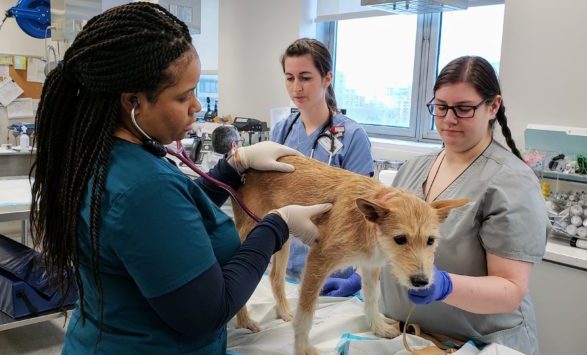Lymphoma in Dogs

Background
Lymphoma is a cancer of the lymphocytes, a type of white blood cell associated with the immune system. It is one of the most common types of cancer in middle-aged and senior dogs, accounting for 15 to 20 percent of all new cancer diagnoses. Lymphoma most often originates in the lymph nodes, spleen, liver, or bone marrow, but can also affect the skin, eyes, central nervous system, gastrointestinal tract, or lungs. Some forms of lymphoma are slowly progressive and active monitoring, rather than treatment, is recommended.
Risk Factors
Although possible causes such as viruses, bacteria, and chemical exposure have been studied, the cause of lymphoma remains unknown. Genetics are believed to play a role since the disease is most often seen in the following breeds:
- Airedale terriers
- Basset hounds
- Boxers
- Bulldogs
- Golden retrievers
- Saint Bernards
- Scottish terriers
Signs
Signs vary depending on which organ is affected, but may include:
- Enlarged lymph nodes
- Fatigue
- Fever
- Increased thirst
Diagnosis
The clinical signs of lymphoma are vague. Bloodwork and a urinalysis help to exclude other diseases from the list of possibilities. X-rays and/or an ultrasound may also be performed to evaluate the internal organs. In some dogs, a highly specialized test called PARR (PCR for antigen receptor rearrangement) is performed on a biopsy sample to confirm a diagnosis of lymphoma.
A highly specialized test called flow cytometry is often performed on samples of lymph node or other organs to more completely characterize the type of lymphoma in the dog.
Treatment
If your dog is diagnosed with lymphoma, your veterinarian will refer you to a board certified cancer specialist called an oncologist who will recommend a treatment plan. Treatment depends on the organs involved, but most cases require chemotherapy since the disease is widespread throughout the body.
Veterinary oncologists treat lymphoma using a variety of chemotherapy drugs. Most commonly used is the CHOP protocol. CHOP is an acronym representing the first letter of each chemotherapy drug in the protocol and is repurposed from human oncology. Despite the bad reputation chemotherapy has, most dog owners report a good quality of life in dogs receiving chemotherapy.
Surgery and/or radiation may be appropriate for certain types of lymphoma, but most cases cannot be effectively treated with surgery or radiation alone. Although lymphoma cannot be cured, the disease can often be put into remission, extending the dog’s life for a year or more. Without treatment, the survival time is about two months unless your dog has a slowly progressive form of lymphoma. In those dogs, survival may be prolonged without treatment.
Prevention
Several studies have found an association between environmental exposure to chemicals such as herbicides and the development of lymphoma. Further study is necessary but keeping your dog away from these environmental factors when possible is a sensible move.
Make an Appointment

Oncology
AMC's Cancer Institute is a revolutionary medical center, created to provide integrative and comprehensive care for pets diagnosed with cancer.
Learn More





























